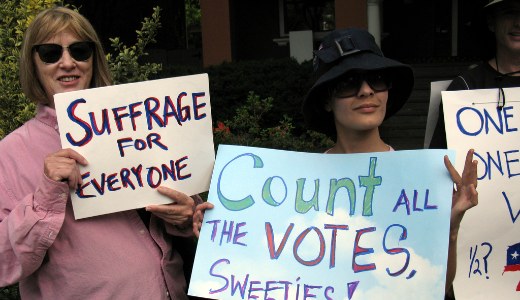
MIAMI – Though they have their biggest and most conservative majority in the state Legislature since at least the Civil War, if not ever, state Republicans seem to be unsure that they can get elected again – at least not fairly.
The Legislature, dominated by tea-party-backed Republicans, first passed a host of unpopular and, critics say, draconian measures. Then, on May 5, it approved a bill that would enact new regulations that opponents charge will weaken voting rights and the ability of grassroots organizations to mobilize, all at the Democratic Party’s expense.
Among the changes in the elections bill adopted by both houses of the Legislature are measures that would make it much more difficult to register to vote, vote early and sign up new voters. For example, the period allowed for early voting would be cut from 14 to eight days.
In addition, voters have been allowed since the 1970s to make changes to their names and addresses on Election Day, while still being able to vote using a regular ballot. The new rules would force such voters to use provisional ballots, which are much more prone to errors and likely to be left uncounted.
Also forced to use provisional ballots would be anyone poll watchers do not believe to be legitimately registered voters. This gives poll workers the right to force anyone to use inferior provisional ballots.
Registering new voters would be much more difficult. Current law allows organizations 10 days after they register a new voter to file the paperwork. Under the new rules, organizations would be required to turn in voter registration forms within two days of signing – or face a $1,000 fine. Opponents charge that, while this seems like a reasonable measure, it would add unnecessary burdens to small grassroots organizations that have little money or infrastructure and that are more likely to register people in communities that tend to vote Democratic.
In addition to this bill, which would enact direct changes in the rules governing voting and electioneering, bills creating indirect changes that would hamper Democrats were introduced as well, including a proposal to ban public sector unions from using dues money for political purposes.
These laws are particularly offensive, many Democrats and other critics say, in that they would disproportionately affect poor and minority communities. In Florida, a state that only a few decades ago was officially segregated, some people think this possible disenfranchisement is no accident.
The new rules are now waiting for Florida Republican Gov. Rick Scott’s signature. While his political leanings are roughly equivalent to Wisconsin’s Scott Walker or Ohio’s John Kasich, it is not a foregone conclusion that Gov. Scott will sign the bill. He is facing plummeting poll figures and, more importantly, the potential of a challenge from the federal government.
Sen. Bill Nelson, a Florida Democrat, said May 6 that if these changes go through, he would request a federal investigation. Florida, he noted, is a state covered by two sections of the federal Voting Rights Act. Any changes in election rules that would disproportionately affect one group must be cleared by the federal government before being signed into law.
“Please veto the elections legislation the Florida Legislature just passed,” Sen. Nelson wrote to Gov. Scott, adding, “Because Florida has five counties needing federal approval in the event of major changes in election procedures, I have asked the U.S. Department of Justice for an investigation if this bill becomes law.”
Sen. Nelson continued, “I remain convinced it is bad for our democratic process.”
Nelson himself is likely to face one of the drafters of the elections bill in 2012. State Senate President Mike Haridopolos announced earlier that he would run for the Republican U.S. Senate nomination.
Photo: Talk Radio News Service // CC 2.0












Comments